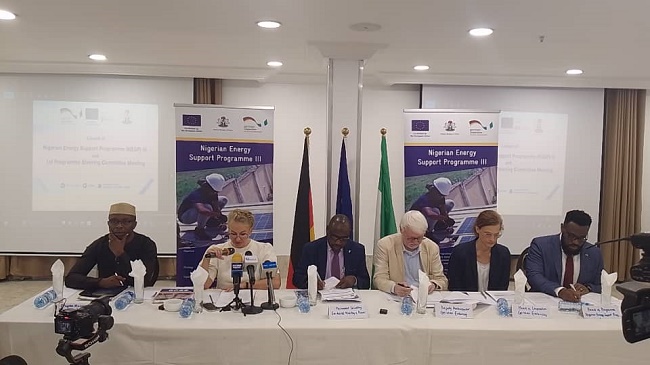The European Union (EU) and the German government, in partnership with the Federal Ministry of Power Nigeria, have announced the launch of the 3rd phase of the National Energy Support Programme (NESP) in Nigeria with €9 million of additional support from the EU.

This brings to a total of €17.9 million of the co-funded technical assistance that has been invested into the 3rd phase of the NESP, which was earlier supported with €8.9 million by the German government in May 2024.
The launch of the NESP 3rd phase was made known during a press briefing held in Abuja, aimed at promoting investments into the domestic market of the sustainable energy sector in Nigeria to address electricity issues and to increase clean cooking, renewable energy, rural electrification, and energy efficiency for vulnerable communities.
The Head of Section Green and Digital Economy at the European Union Delegation to Nigeria and the ECOWAS, Ms. Inga Stefanowicz, described the impact of the programme’s achievements since its 10-year implementation. While speaking at the launch, she said they have supported the Nigerian government in the development of policies and regulations, capacity building of the sector, data for planning, access to finance and investments, and others.
“For example, the development of a one-stop investment platform for renewable energy and energy efficiency, and the development and launch of 37 standard solar PV batteries, inverters, and metres; support to industries under the energy efficiency network (EEN); the initiative to achieve INSO 5001 certifications; the development of the Nigerian building energy efficiency code (BEEC); launch of the centre data management system for electrification planning; and the funding of 25 interconnected mini-grids under the IMAS Scheme,” she stated.
The plans under this new phase (NESP III) are that 154,000 people will have access to new or improved electricity, 30,000 people will get access to LPG for clean cooking, and an installation of 8 megawatts of additional renewable energy capacity for energy supply.
According to the organisers, the NESP was first commissioned in 2013 with €24.5 million co-founded by the EU and the German government. From 2017-2021, the second phase of the NESP received €33 million. The market is worth N9.2 billion annually in a report by the Rural Electrification Agency, REA, and the NESP fosters an enabling environment for several value chains while supporting business model cases for off-grid distribution companies to attract investments and funding grants. So far, in Phase 1, six locations have been reached, including Ogun, Cross River, Plateau, Sokoto and Niger.
During the press briefing of the strategic co-investment in the third phase, the Permanent Secretary, Federal Ministry of Power, Mahmuda Mamman, reiterated the Ministry’s appreciation of the continuous efforts by the EU and the German government in supporting Nigeria’s energy security in an affordable and sustainable way.
He described it as a “welcome idea” that would step ahead from the 2nd phase accomplishments in bringing and the Nigeria’s Electricity Act 2013, which looks to strengthen the electricity market at the sub-national levels.
According to the German Deputy Ambassador, Mr. Johannes Lehne, over 24,000 people are expected to get electricity through renewable energy in Nigeria, including Lagos, Rivers, and Ogun.
He said, “Technologies and investments for renewable energy and energy efficiency will be key for diversifying Nigeria’s energy mix and decarbonising the (5) critical sectors identified in the Energy Transition Plan (ETP).”
The project looks toward a $700 million co-investment involving the EU, the Ministry of Power, and the German government, of which $160 million will be used to install necessary modern transformers for steady electricity, with 35 new transformers expected by 2027. The organisers also believe that interconnected mini-grids (DISCOs) are crucial in Nigeria’s electricity system and that the interconnected mini-grids scheme will be coming up soon.
The co-implementing partner, GIZ, and the Head of Programmes, NESP, Duke Benjamin, revealed that grants are used to support the private sector to increase accessibility and affordability of electricity at the unserved and underserved communities in Nigeria.
He emphasised that “active participation and collaboration with the public and private stakeholders is critical to improving the availability and reliability of energy in Nigeria”.
By Nsikak Emmanuel, Abuja
